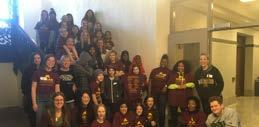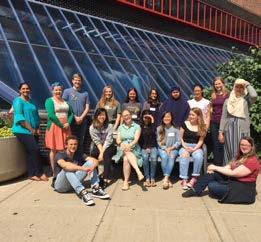
7 minute read
From Our Centers
from 2020 UMN Mathematics Newsletter
by College of Science and Engineering at the University of Minnesota
School of Mathematics Center for Educational Programs (MathCEP)
The past year at MathCEP started with welcome news, when the three directors (Duane Nykamp, Jonathan Rogness and Mike Weimerskirch) received a $1.5 million grant from the NSF to build an open data-driven educational technology platform (doenet. org) to facilitate the creation and evaluation of online learning materials. The University of Minnesota Talented Math Program (UMTYMP) continues to be very strong, and enrollment in our Saturday morning enrichment programs was up 40% this year compared to last. A MathCEP postdoc, Kathryn McCormick, received a continuation grant to continue a special enrichment program aimed specifically at girls in middle school, with the assistance of our other postdocs, Anila Yadavalli and Alexis Johnson. Unfortunately, the coronavirus had a large effect our programs. The on-campus enrichment events came to a screeching halt in March, and our K12 summer programs have either been canceled or moved online. Meanwhile, our faculty and staff not only worked to convert their own UMTYMP and department courses to the new online format, but served as a resource for other instructors in our department and beyond. Weimerskirch, for example, was a member of a three-person panel in MIT’s Electronic Seminar on Mathematics Education, and gave advice to nearly 200 faculty members from around the country on how best to revamp their courses to an online format. As always, each year brings transitions with faculty and students. Kathryn McCormick is finishing her postdoc position, and will begin a tenure track position at CSU Long Beach in the fall. The department’s MS Math with Emphasis in Math Education program, whose students worked closely with MathCEP faculty in various programs, will graduate three students this year. Carolynn Johnson and Matthew Brisbin will begin secondary teaching careers (in Minnesota and South America, respectively), and Brinley Stringer will continue on to the joint doctoral program in mathematics education at UCSD/SDSU in San Diego. Our saddest transition was the sudden loss of Stan Pride this spring (See Remembering Former Colleagues article) Stan was a fantastic resource for faculty in MathCEP and the department as a whole. He was always eager to help and was a friendly, caring colleague. Hours before he died he was part of a virtual “MathCEP Lunch Hour,” taking the time to ask everybody how they were coping with the state’s stay-at-home order, and talking about John Prine and other musicians who had influenced his life. We were
MathCEP’s 2019-2020 program for middle school girls - GLEAM (Girls Learning and Exploring Applications of Mathematics)
all shocked by the news of his passing, and will miss him dearly.
Institute for Math and its Applications (IMA)
As the IMA’s model has shifted away from NSF funding, it continues to develop programs that bring together mathematicians and scientists from academia, industry and government labs. During this past year activities included a highly interdisciplinary program on computational imaging, a summer school on lowdimensional topology, geometry, and applications, a program in graph theory, along with numerous coding sprints and workshops. Along with these programs, the IMA’s Data Science Lab director, Gilad Lerman, organized a popular year-long seminar series in data science and the industrial problems seminar series. As a visitor institute, the IMA is learning to adapt to the “new normal” brought on by COVID-19. Though many in person programs have been canceled, the IMA will be bringing several programs online this summer, including its seminar series and a version of its Math-to-Industry Boot Camp. During the 2019-2020 year the IMA continued to strengthen its three year old Data Science Consortium, welcoming in the Mayo Clinic as a full member of the partnership. This consortium, founded three years ago with the inaugural members Target Corporation and Cargill, Inc., provides support for industrial postdocs and scientific activities. Industrial postdocs spend half of their time working on projects directed by industrial scientists and the other half at the IMA doing research with a faculty mentor. This coming year the IMA looks forward to co-hosting several important activities, including the Math Alliance’s Field of Dreams Conference and the 50th Anniversary Association for Women in Mathematics Research Symposium.
MCFAM students, instructors and Center collaborators were involved in experiential learning, research and public service over the past year. Actuarial and MFM students (Songyu Yang, Yifei Luo, Meggie Wen, and Ameya Phadke) participated in a research project on Indexed Universal Life (IUL) Insurance. Generous funding for the project and collaboration came from Tonkagroup LLC. Songyu Yang presented the research at the largest Actuarial Research Conference in North America (ARC). University of Minnesota sophomores majoring in mathematics, statistics, computer science and economics (Nathaniel Budijono, William Chan, Stuart Fronk, and Kevin Meng-Lin) received an
Girls’ Machine Learning Summer Day Camp Honorable Mention at the virtual 2020 MUDAC Competition; they analyzed and modeled an industry problem using real world data. The Machine Learning Summer Camp for High School Students was held over two weeks in June 2019. Camper projects ranged from gender classification, using tweets, to handwritten digit recognition. Sponsors and donors included: Securian Financial, The Travelers Companies, Target, UMN School of Statistics, Nic Pifer, and Hartmut Durchschlag. This summer’s one week virtual Camp is set for July 20-24. More details here on the 2020 virtual camp. MCFAM was also pleased to accept generous gifts from Cargill Risk Management and Allianz Investment Management. They are the inaugural leadership donors for “The MFM Fellowship for Opportunity and Advancement”, created to fully fund students who increase diversity in the MFM student body. These gifts, as well as others, will be used to recruit the first MFM student to be fully funded for the incoming class of 2021.

MATH LIBRARY NEWS
The Mathematics Library’s eventful year included not one but two temporary closures. First, a couple weeks over winter break to repair a damaged ceiling, which required asbestos abatement. We took the opportunity to make other improvements, such as installing a large white board by the entrance, which then displayed the AMS’s new Page-A-Day calendar among other things. Students and faculty members coming in and out could thereby get a daily dram of new math. We also added portable white boards in the reading room to facilitate group study, as well as a large portable monitor that can be connected to any device, but is particularly useful for displaying the Bloomberg Professional financial data, which the library and Minnesota Center for Financial and Actuarial Mathematics (MCFAM) collaboratively provide. Then there was the COVID-19 closure, beginning in mid-March 2020. Working with the business librarians and the Carlson School
MCIM exposes our graduate students to the mathematical challenges and skills that arise in industry, while helping them become either leaders in industry or leaders in academia with a broad background in industrial applications. It also fosters research collaborations between industrial and academic researchers. In both the fall and the beginning of spring terms, we engaged in a joint IMA/MCIM Industrial Problems Seminar that hosted a wide range of industrial speakers. The seminar talks provided a window on the daily activities of mathematicians in industry. Industrial visitors also got to learn about the strength and expertise within our department. These visits resulted in several summer internships. Additional internships and permanent positions were organized. The challenges of COVID-19 motivated us to identify ways to increase student access to industrial projects and help to analyze COVID-19 data. MCIM director Gilad Lerman joined a local task force, which includes the Ecolab data science team, where former graduate student, Dr. Jimmy Broomfield works. The task force, graduate student Sarah Milstein and the SIAM Student Chapter, are facilitating, supporting, and working together with students to answer some of the open questions on Kaggle related to COVID-19.
While the IMA/MCIM Industrial Problems Seminar got cancelled this spring, future online summer talks are scheduled with industrial researchers working on COVID-19. Similarly, and in collaboration with the MCIM director, online summer talks are arranged at the IMA Data Science Lab Seminar, featuring leading data scientists who work on COVID-19. To better prepare for industrial experience in data science, Lerman guided students in data science competitions. Two graduate teams joined the fall 2019 MinneMUDAC student data challenge. The “Women in Math and Stats” team placed second and won the Analytical Acumen Award (See Awards and Recognition article). In the spring, two undergraduate teams competed in the 2020 MUDAC student data challenge, analyzing historical court data and predicting outcomes of civil rights litigation.
of Management, remote access to Bloomberg was enabled, when usually these database subscriptions are strictly tied to a specific computer. The library also implemented several programs to provide emergency e-book access, most critically to textbooks for large-enrollment courses like calculus (normally not available online for libraries) but also more broadly through the HathiTrust scanned book repository, a Big 10 library collaboration. It’s estimated that the University Libraries are thus providing access to about 70% of the print collection in May 2020; fulfilling requests for the rest will be a priority during the university’s phased reopening. Other information requests are being handled remotely by the math librarian and library assistant (Kristine Fowler and Lynn Tran), working from home; these emails, online chats, and phone calls are close to normal operation. But it was new for Kris to co-teach a session on data management via Zoom and Canvas, rather than in the classroom, for STAT 8801. We look forward to seeing people back in the Math Library!









